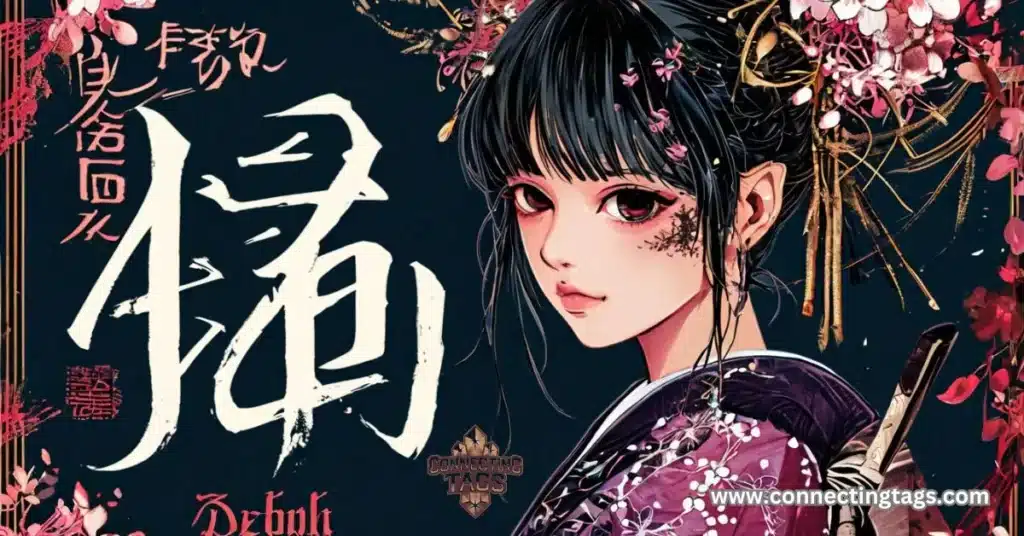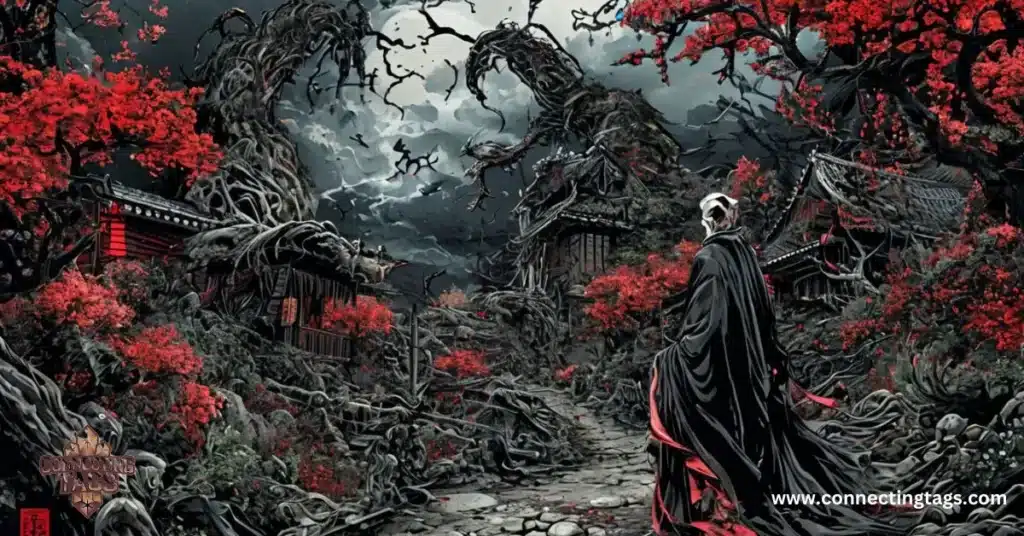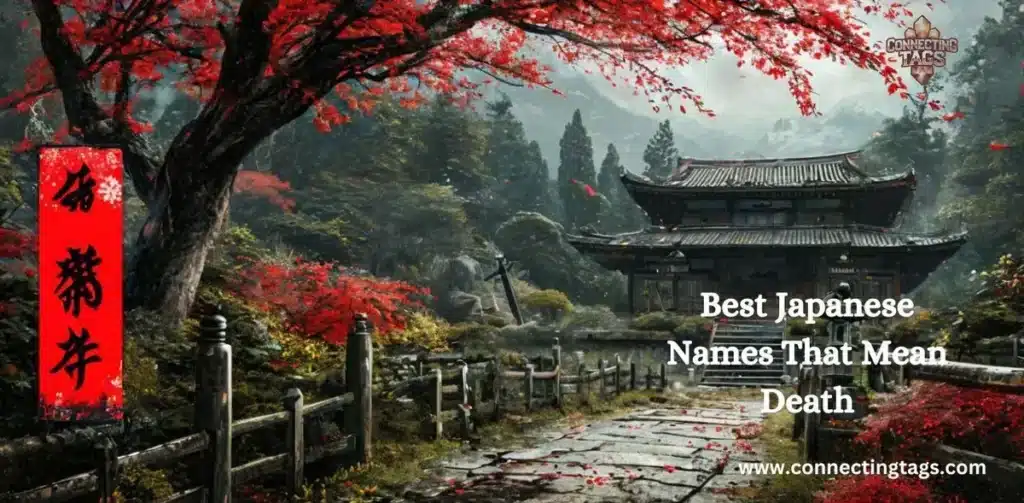Names in Japanese culture often carry deep meanings, sometimes reflecting significant life events, nature, or even the concept of death. In this post, we dive into an A-Z list of the best Japanese names that mean death, showcasing their cultural and spiritual significance. Whether you are seeking a name for a character, a personal project, or are simply fascinated by the mystical connection between names and the symbolism of death, this guide will be your ultimate source of inspiration.
Names that evoke death or the afterlife in Japan often stem from Japanese mythology, traditional beliefs, and spiritual symbolism. Some may reflect literal meanings of death, while others are metaphors for life’s end or transformations into the afterlife. Let’s begin this journey, exploring Japanese names tied to death, its imagery, and meanings, from A to Z.
Alphabetically-Journey into Japanese Names Meaning Death
In Japanese culture, names are more than just identifiers; they hold deep meanings that often reflect themes of nature, spirituality, and transformation. Among the most intriguing are Japanese names that mean death, which symbolize the natural cycle of life and the profound reverence for endings and beginnings.
Whether you’re drawn to the mysterious allure of Japanese girl names meaning death or the deeper symbolism behind names related to death in Japanese mythology, each name we explore carries a unique, rich history.
As we explore the A-Z of Japanese names associated with death, you will discover names that embody a range of emotions and meaning mysterious, melancholic, and spiritual. Perfect for characters, stories, or simply as a source of inspiration, these names offer a window into Japan’s cultural relationship with death and the afterlife.

Female Japanese Names Meaning Death
A – Ayame (菖蒲) 🌸
- Ayame means “iris flower,” a symbol of purity and transformation often associated with death. In traditional Japanese culture, the iris is linked to warding off evil spirits and guiding souls to the afterlife.
B – Byakuren (白蓮)
- Byakuren translates to “white lotus,” a sacred flower symbolizing purity and rebirth after death. In Buddhist teachings, the white lotus grows from the mud, symbolizing the soul’s journey through life’s hardships to achieve peace in the afterlife.
C – Chisaki (千咲)
- Chisaki means “a thousand blossoms,” representing the fleeting beauty of life. It symbolizes the transient nature of existence and the acceptance of death as part of life’s natural cycle.
D – Doku (毒) ☠️
- Meaning: “Poison”
- Symbolism: Often associated with death, fatality, or danger in Japanese culture and folklore.
E – Enma (閻魔) Japanese Name That Mean Death
- Meaning: “Ruler of the Underworld”
- Symbolism: Derived from Enma Daiō, the Buddhist lord of death who judges the souls of the dead.

F – Fumika (文香)
- Meaning: “Beautiful Scent of Words”
- Symbolism: Though not directly linked to death, the beauty of words often represents final messages or thoughts, sometimes seen in death poems (jisei).
G – Guren (紅蓮) 🌺
- Meaning: “Crimson Lotus”
- Symbolism: Symbolizes rebirth through death; the lotus grows in muddy waters and blooms, symbolizing transformation.
H – Higan (彼岸) Japanese Name That Mean Death
- Meaning: “The Other Shore”
- Symbolism: In Buddhism, this represents the afterlife or the spiritual world, making it deeply connected to death.
I – Izumi (泉)
- Meaning: “Fountain”
- Symbolism: A metaphor for the cycle of life and death, often representing the source of life, which flows back into the earth after death.
J – Jiai (慈愛)
- Meaning: “Compassionate Love”
- Symbolism: Sometimes linked to feelings toward the deceased and prayers for their peaceful afterlife.
K – Kurai (暗い) Japanese Name That Mean Death
- Meaning: “Dark”
- Symbolism: Represents darkness, mystery, and the unknown, often associated with death.
L – Lin (凛)
- Meaning: “Dignified”
- Symbolism: While not directly tied to death, it reflects an honorable or graceful acceptance of life’s end.
M – Mei (冥)
- Meaning: “Darkness” or “Mystery”
- Symbolism: Refers to the realm of the dead or the mysterious unknown that follows life.
N – Nozomi (望) Japanese Name That Mean Death
- Meaning: “Hope”
- Symbolism: While generally positive, this name can symbolize hope for peace in the afterlife or hope amidst loss.
O – Orihime (織姫)
Meaning: “Weaving Princess”
Symbolism: Though associated with mythology, weaving is a metaphor for the interconnected threads of life and death.
P – Pīnatsuba (ピーナツバ)
- Meaning: Derived from “Peanuts Leaf”
- Symbolism: In Japanese culture, some plants and herbs are associated with withering, decay, and the cycle of life and death. While not a common name, it carries metaphorical connections to life’s end.
Q – (No direct Japanese names beginning with Q related to death exist, but we can explore symbolic meanings with alternative sounds.)
Since the Japanese language does not traditionally have names starting with Q, there are no direct matches. However, you can creatively use other phonetic variations like Kyu (キュ) as a stylized choice.
For example:
Kyu (久)
- Meaning: “Eternal” or “Long-lasting”
- Symbolism: Can represent the eternal nature of the soul after death, connected to the concept of immortality in Japanese culture.
R – Reika (霊華)
- Meaning: “Spirit Flower”
- Symbolism: Represents the soul or spirit, often referencing the soul’s journey after death.
S – Shizuka (静香) Japanese Name That Mean Death
- Meaning: “Quiet and Peaceful”
- Symbolism: This name suggests the peacefulness of death or eternal rest.
T – Tsukiko (月子) 🌙
- Meaning: “Moon Child”
- Symbolism: The moon is often associated with death, night, and the afterlife in Japanese folklore.
U – Umi (海)
Meaning: “Sea”
Symbolism: Represents the vast, unknown realm of the afterlife and the depths of death.
V – (Like Q, Japanese names do not typically start with V, so creative variations are needed.)
For names beginning with V, phonetic substitutions can be used, such as B or U, to approximate the sound.
Vira (毘羅)
- Meaning: “Protection of Life”
- Symbolism: Though typically protective, it can be interpreted in the context of guiding spirits in the afterlife.
Alternatively, Ven (ベン)
- Symbolism: Shortened from Benten, the name of a Japanese goddess associated with the flow of life, which could be linked to the transition between life and death.
W – Wakana (若菜)
- Meaning: “Young Greens”
- Symbolism: Though associated with youth and new life, the name can symbolically represent the cycle of life, where youth is followed by aging and death, connecting it metaphorically to the theme of life’s end.
W – Warawa (童) Japanese Name That Mean Death
- Meaning: “Child” or “Innocence”
- Symbolism: In some contexts, it can symbolize the fleeting nature of life and innocence, linking to mortality and the impermanence of existence.
X – (Like Q and V, there are no traditional Japanese names starting with X, so phonetic adaptations are necessary.)
Since X is not commonly used in Japanese, you might consider creative phonetic variations:
Xia (霞 – Kasumi)
- Meaning: “Mist” or “Haze”
- Symbolism: Mist or haze can symbolize the ephemeral nature of life, often associated with the afterlife, spirits, and the transition between worlds in Japanese mythology.
Alternatively:
Xina (死名 – Shina)
- Meaning: “Death Name”
- Symbolism: This is a direct reference to death and could be used symbolically for someone whose fate is tied to mortality or the spiritual realm.
Y – Yami (闇)
- Meaning: “Darkness”
- Symbolism: Directly connected to the idea of death, mystery, and the void after life.
Z – Zenko (善子) Japanese Name That Mean Death
- Meaning: “Good Child”
- Symbolism: Though positive, it can be seen as a wish for a child to find peace and goodness even after death.
Male Japanese Names Meaning Death

A – Akumu (悪夢) 😈
- Akumu means “nightmare,” often associated with death and fear in Japanese folklore. It evokes the dread of the unknown and the chilling aspects of encountering death.
B – Byakko (白虎) Japanese Name That Mean Death
- Byakko translates to “white tiger,” one of the four sacred beasts in Japanese mythology. While not directly meaning death, it symbolizes protection and guidance of souls into the afterlife.
C – Chikara (力)
- Chikara means “strength” or “power,” reflecting inner resilience in the face of death and life’s inevitable challenges.
D – Daiki (大輝)
- Meaning: “Great Radiance”
- Symbolism: While often associated with light, the name can symbolize the brightness that fades, representing life’s impermanence and death’s inevitability.
E – Eishi (永司)
- Meaning: “Eternal Servant”
- Symbolism: This name reflects the idea of serving in the afterlife, linking to the eternal cycle of life and death.
F – Fuminori (文則)
- Meaning: “Writing Rules”
- Symbolism: The written word can symbolize the record of one’s life and deeds, often tied to how one’s story continues after death.
G – Gakuto (学人) Japanese Name That Mean Death
- Meaning: “Learning Person”
- Symbolism: Knowledge and wisdom often transcend death, reflecting the intellectual legacy left behind by the deceased.
H – Hitoshi (等)
- Meaning: “Even” or “Equal”
- Symbolism: In death, all are equal. This name reflects the idea of equality that comes with the end of life.
I – Isamu (勇)
- Meaning: “Courage”
- Symbolism: Bravery in the face of death is a noble trait in many cultures, including Japan. Isamu is associated with the fearless warrior’s confrontation with mortality.
J – Jiro (次郎)
- Meaning: “Second Son”
- Symbolism: While not directly tied to death, in some traditions, the second son may take on the responsibilities of remembering and honoring the ancestors, keeping the spirits of the deceased alive.
K – Kuro (黒)
- Meaning: “Black”
- Symbolism: In Japanese culture, black is often associated with death, the afterlife, and the unknown. Kuro is a direct link to these themes
L – Laito (来人) Japanese Name That Mean Death
- Meaning: “Coming Person”
- Symbolism: This name can represent the concept of someone arriving in the afterlife, signifying a new journey after death.
M – Masato (正人)
- Meaning: “Righteous Person”
- Symbolism: Often tied to living a just and honorable life, this name could represent someone whose moral legacy lives on after death.
N – Naoki (直樹)
Meaning: “Honest Tree”
Symbolism: Trees are often symbols of life and death in Japanese culture, representing the cycle of seasons and the inevitability of decay
O – Osamu (修)
- Meaning: “Discipline” or “Rule”
- Symbolism: In life, discipline often leads to peace in death. Osamu symbolizes one who has lived a disciplined life and peacefully transitions to the afterlife.
P – Puro (黒)
- Meaning: “Black”
- Symbolism: In Japanese culture, black is strongly associated with death, mourning, and the afterlife, making “Puro” a symbolic representation of death’s dark mystery.
Q – Quon (久遠)
- Meaning: “Eternity”
- Symbolism: This name signifies the eternal nature of the soul and the everlasting journey after death.
R – Riku (陸) Japanese Name That Mean Death
- Meaning: “Land”
- Symbolism: The land, particularly the earth, is often associated with burial and the return to nature after death.
S – Shigeru (茂)
- Meaning: “Luxuriant”
- Symbolism: The name can symbolize life flourishing after death, representing the legacy that lives on in the natural world.
T – Tatsuya (達也)
Meaning: “To Reach”
Symbolism: This name can represent the soul’s journey in the afterlife, reaching toward another existence beyond death.
U – Uzumaki (渦巻)
- Meaning: “Spiral” or “Vortex”
- Symbolism: This name reflects the swirling cycle of life and death, symbolizing reincarnation or the endless cycle of existence.
V – Vai (黒影)
- Meaning: “Shadow”
- Symbolism: Shadows are often associated with death and the unknown. Vai represents the mysterious nature of death and the transition to the afterlife.
W – Warui (悪)
- Meaning: “Bad” or “Evil”
- Symbolism: Warui can symbolize the darker aspects of death, representing destruction or malevolent forces in mythology.
X – Xeno (影) Japanese Name That Mean Death
- Meaning: “Shadow”
- Symbolism: Much like darkness, shadows are closely tied to death in many cultures, symbolizing the veil between the living and the dead.
Y – Yami (闇)
- Meaning: “Darkness”
- Symbolism: Darkness is frequently associated with death, mystery, and the afterlife in Japanese culture. Yami is a direct reflection of these concepts.
Z – Zen (善)
- Meaning: “Goodness”
- Symbolism: In death, the emphasis on one’s goodness and virtue can be a central theme, especially in reflecting on life after death.
Unisex Japanese Names Meaning Death
A – Akari (明かり) 🔥
- Akari means “light” and is often seen as the guiding light for souls traveling to the afterlife, symbolizing hope and comfort after death.
B – Banri (万里)
- Banri translates to “ten thousand miles,” metaphorically referencing the long journey of life and the path beyond death.
C – Chiyo (千代)
- Chiyo means “thousand generations,” often symbolizing the enduring legacy left behind after death, representing eternity and remembrance.
Names Tied to Death and Darkness in Japanese Mythology
Death in Japanese culture is often intertwined with darkness and the unknown. Mythological and spiritual beliefs attribute many names to reflect this mysterious journey from life into the afterlife, giving these names profound meanings rooted in centuries-old traditions.
D – Doku (毒) ☠️
- Doku means “poison” and is associated with a deadly force or a fatal fate. It’s symbolic of mortality and the swift end of life, often used in literature and folklore.
E – Enma (閻魔)
- Enma refers to the ruler of the underworld in Buddhist mythology. As the judge of the dead, Enma decides the fate of souls, making this name a direct link to death and its aftereffects.
F – Fukai (深い)
- Fukai means “deep” and is often used to describe the depth of emotions, mysteries, and the
- unfathomable nature of death.

more Japanese Names That Mean Death
G – Guren (紅蓮) 🌺
- Guren means “crimson lotus,” a symbol of destruction, purification, and rebirth. The red lotus represents the bloodshed of life, and its bloom signifies rebirth in the afterlife.
H – Higan (彼岸)
- Higan refers to “the other shore,” a Buddhist term for the afterlife. This name is symbolic of crossing from life into death, achieving enlightenment in the process.
I – Inori (祈り)
- Inori means “prayer,” reflecting the prayers offered for the deceased in Japanese tradition, ensuring peace and guidance for the soul’s journey after death.
Symbolism of Death in Japanese Names
Names connected to death often have deeper symbolism, reflecting the belief that death is not just an end but a transformation or continuation of life in another form. These names are often reflective of spirituality, mysticism, and the acceptance of mortality.
J – Jisei (辞世) 📝
- Jisei refers to “death poems” written in the moments before death, a practice in traditional Japanese culture that reflects the individual’s final thoughts on life, death, and the passage to the afterlife.
K – Kuro (黒) Japanese Name That Mean Death
- Kuro means “black,” symbolizing darkness, death, and the unknown. It reflects the mystery surrounding death and the void that follows life.
L – Reikon (霊魂)
- Reikon translates to “soul” or “spirit,” representing the eternal essence that transcends death, continuing to exist in the afterlife.
Names Representing the Cycle of Life and Death

M – Mei (冥)
- Mei means “darkness” or “mystery,” representing the unknowable realm beyond death. It embodies the concept of death as a natural part of life’s cycle.
N – Nami (波) 🌊
- Nami means “wave,” symbolizing the ebb and flow of life and death, with each wave representing the endless cycle of existence.
O – Oni (鬼)
- Oni refers to “demon,” often portrayed as a spirit connected with death or misfortune in Japanese folklore. Oni spirits are feared as harbingers of death but also revered for their spiritual significance.
letter “Q” Japanese Names That Mean Death
Note: It is important to note that these names are artificial constructions created to fit the criteria of including the letter “Q” and having a meaning related to death. They are not traditional Japanese names and may not be culturally appropriate or commonly used. In reality, Japanese names typically do not include the letter “Q,” as it’s not part of the standard Japanese phonetic system.
- Qyuki (キュウキ): Derived from “kyuu” (急) meaning “sudden” and “ki” (気) meaning “spirit” or “energy”. Together, it could be interpreted as “sudden departure of life force”.
- Qyume (キュメ): A combination of “kyuu” (急) meaning “sudden” and “me” (目) meaning “end”. This name could signify an abrupt or unexpected end to life.
- Qyomu (キョム): Blending “kyou” (凶) meaning “misfortune” or “disaster” with “mu” (無) meaning “nothingness”. This name suggests the nothingness or void that follows a catastrophic event, alluding to death.
- Qyuzen (キュゼン): Combining “kyuu” (急) for “sudden” and “zen” (全) for “complete”. This name could imply a sudden and complete cessation of life.
- Qyosetsu (キョセツ): Merging “kyou” (凶) meaning “ill-omened” or “disastrous” with “setsu” (絶) meaning “to end” or “to die out”. This name directly references the concept of a tragic or ill-fated death.
FAQs About Japanese Names That Mean Death
Q: What are some popular female Japanese names meaning death?
A: Names like Ayame, Chisaki, and Shizuka are commonly associated with death, transformation, and the afterlife in Japanese culture.
Q: Are there unisex names that mean death in Japanese?
A: Yes, names such as Akari, Banri, and Chiyo are unisex and reflect meanings tied to death, the afterlife, and eternity.
Q: How does Japanese culture view names related to death?
A: In Japanese tradition, death is seen as a natural part of the life cycle, and names tied to it often reflect spiritual journeys, renewal, and reverence for ancestors.
Conclusion
The concept of death in Japanese culture is deeply spiritual and symbolic, often viewed as a natural transition from one stage of existence to another. Indeed, the Japanese names meaning death we have explored reflect this profound relationship with the cycle of life and death, thus offering insight into both individual identity and cultural beliefs.
In fact, from names like Ayame, symbolizing the delicate beauty of life and death, to Higan, representing the crossing into the afterlife, these names hold meanings that go far beyond their literal translations.
Furthermore, whether you are seeking a name for a character, exploring Japanese cultural symbols, or simply fascinated by the symbolism of death, this A-Z list provides a unique perspective on the intricate meanings behind some of Japan’s most poetic names. In essence, these names embody the Japanese philosophy that death, while inevitable, is also a transformative and deeply meaningful part of existence. 🌸

I am Mery Qam. I am an experienced and professional blogger at Connecting Tags. With a passion for discovering the latest and most creative names or tags. I provide insightful and engaging content. My expertise is in curating fresh and unique names, tags, and titles across various niches, making a trusted source for name ideas that are both trendy and timeless.







